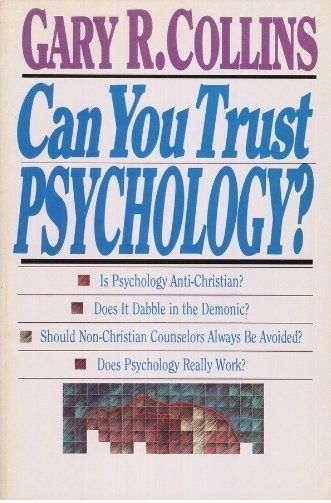Attempting to Harmonize Psychology with Christianity
Collins, Gary. Can You Trust Psychology? Exposing the Facts and the Fictions. Downers Grove, IL: InterVarsity Press, 1988.

Gary Collins, professor of psychology at Trinity Evangelical Divinity School (Ph.D. Perdue University), claims to write Can You Trust Psychology? as an attempt to provide a “balanced reaction to psychology’s critics” in the ongoing debate over psychology’s trustworthiness (12). As a psychologist who states that he is also a Christian, Collins seeks to harmonize and mend the divide by acknowledging what he sees as valid criticisms of psychology while at the same time challenging Christian critics that he believes are sensationalist or inaccurate. Collins states that he believes his book is fair, balanced, and Christ-honoring (12).
While Collins asks strong questions as the basis for each of the book’s chapters, I must say that I wholly disagree with how Collins responds to them. At times Collins makes positive, agreeable, statements. For example, he recognizes that all believers are expected to help and show practical concern for others (81) and that the Bible never implies that God wants people to simply have a “positive attitude” that ignores our dependence on Him (160). He also acknowledges several problems with psychology (119–121).
The problem is, however, that Collins often uses poor and unbiblical arguments (47, 90, 95), overly optimistic views (80), eisegesis (71–3,76), unsubstantiated assertions (102, 115,130, 136), contradictions (120), faulty logic (124), and displays a lack of belief in the sufficiency of the Bible for counsel to godly living (55, 79, 95). Collins contrasts some of psychology’s assumptions about the anthropology of man with sin as man’s chief problem, but he then wrongly proceeds to claim that secular and Christian “approaches overlap,” and so it is “harmful and invalid” to propose there is one way that deals with the “cure of souls [without the positive overlap of psychology]” (58–9). Sadly, Collins appears to defend his beloved profession of psychology in an almost desperate manner.
Christians reading this book will see a soul care that “copes” using man’s wisdom, instead of the Christ-honoring, empowering, living hope that is powerfully given in Scripture (38). If you're interested in learning more about Biblical Counseling, I would recommend taking a closer look at the Association of Certified Biblical Counselors. They have no interest in pursuing licensure by the State regulatory authorities. Instead, biblical counselors pursue the task of lovingly pointing people to the truth of God's Word no matter the situation in life in which a person finds themselves. If this is an area of interest to you, drop me a line and let me know. I'd love to hear from you.
- Pastor John
While Collins asks strong questions as the basis for each of the book’s chapters, I must say that I wholly disagree with how Collins responds to them. At times Collins makes positive, agreeable, statements. For example, he recognizes that all believers are expected to help and show practical concern for others (81) and that the Bible never implies that God wants people to simply have a “positive attitude” that ignores our dependence on Him (160). He also acknowledges several problems with psychology (119–121).
The problem is, however, that Collins often uses poor and unbiblical arguments (47, 90, 95), overly optimistic views (80), eisegesis (71–3,76), unsubstantiated assertions (102, 115,130, 136), contradictions (120), faulty logic (124), and displays a lack of belief in the sufficiency of the Bible for counsel to godly living (55, 79, 95). Collins contrasts some of psychology’s assumptions about the anthropology of man with sin as man’s chief problem, but he then wrongly proceeds to claim that secular and Christian “approaches overlap,” and so it is “harmful and invalid” to propose there is one way that deals with the “cure of souls [without the positive overlap of psychology]” (58–9). Sadly, Collins appears to defend his beloved profession of psychology in an almost desperate manner.
Christians reading this book will see a soul care that “copes” using man’s wisdom, instead of the Christ-honoring, empowering, living hope that is powerfully given in Scripture (38). If you're interested in learning more about Biblical Counseling, I would recommend taking a closer look at the Association of Certified Biblical Counselors. They have no interest in pursuing licensure by the State regulatory authorities. Instead, biblical counselors pursue the task of lovingly pointing people to the truth of God's Word no matter the situation in life in which a person finds themselves. If this is an area of interest to you, drop me a line and let me know. I'd love to hear from you.
- Pastor John
Recent
Is Jesus God?
January 20th, 2026
Did God Approve of Polygamy
January 12th, 2026
Entering the New Year Anchored, Not Anxious
January 2nd, 2026
Why Christmas Matters: Immanuel, Prophecy, and God’s Perfect Timing
December 13th, 2025
The Truth About the “Spirit of Jezebel”: Why the Idea Is Not Biblical — and Why It Is Spiritually Dangerous
December 2nd, 2025
Archive
2025
April
September
October
2024
February
April
July
December
2023
